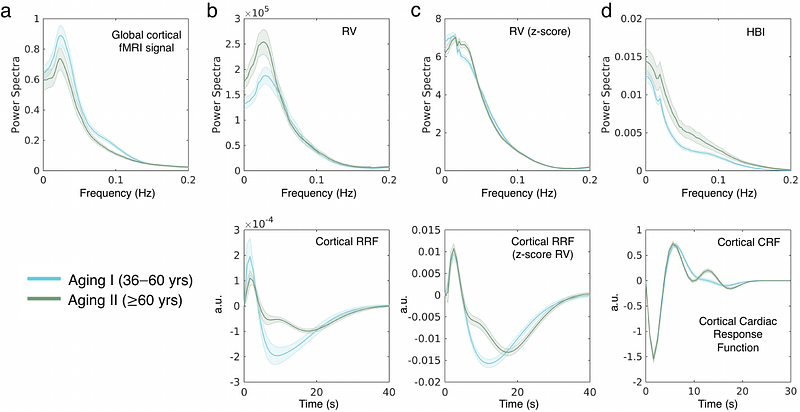Functional MRI Signatures of Autonomic Physiology in Aging

Functional MRI Signatures of Autonomic Physiology in Aging
Fan, J.; Juttukonda, M. R.; Goodale, S. E.; Wang, S.; Orban, C.; Varadarajan, D.; Polimeni, J. R.; Chang, C.; Salat, D. H.; Chen, J. E.
AbstractWhile traditionally regarded as \"noise\", blood-oxygenation-level-dependent (BOLD) fMRI fluctuations coupled to systemic physiology--such as heart rate and respiratory changes--also hold valuable information about brain vascular properties and autonomic function. In this study, we leverage these physiological BOLD signals to characterize age-related changes in brain physiology. Using a large dataset from the Lifespan Human Connectome Project Aging study, we investigated how the spatiotemporal BOLD-fMRI signatures of autonomic physiology, specifically heart rate and respiratory variation, change with advancing age. Our findings reveal that aging is associated with globally slower respiratory fMRI responses, alongside faster cardiac fMRI responses and enhanced brain-cardiac signal coupling. Moreover, we show that the impact of age on physiological fMRI signals exhibits a notable turning point after age 60, suggesting a critical role of declining vascular health and autonomic function in aging. The potential impact of age-related changes in brain structure, tissue perfusion, and in-scan arousal states on the identified physiological fMRI patterns is also tested and discussed. Altogether, our results underscore significant age effects in the fMRI signatures of systemic physiology, emphasizing the pivotal role of altered vascular properties and autonomic function in aging. Methodologically, this study also demonstrates the utility of resting-state fMRI for extracting multi-parametric information about brain physiology, offering new biomarker opportunities that complement established functional connectivity metrics.